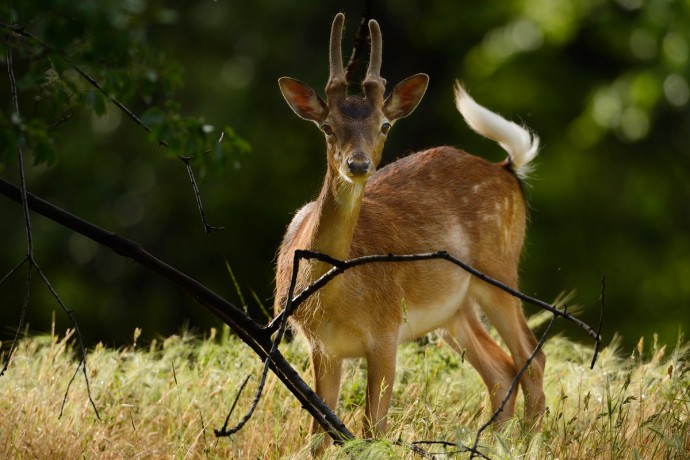Mid January this year, 35 fallow deer were released in two priority rewilding sites in the Rhodope Mountains in Bulgaria. The deer now released in Tintyava region in the Krumovgrad Municipality and Chernoochene village near the town of Kardzhali joined 88 other fallow deer and their offspring that were released during the last three years.

The group of fallow deer were captured and translocated from the adjacent Studen Kladenets reserve where some 1 500 animals, the largest population in Bulgaria, are living in the wild. After a three-month long stay in a quarantine zone and adaptation enclosure the animals were released into the rewilding sites of Chernoochene and Tintyava. The goal is to restore the fallow deer population in the Eastern Rhodopes – together with red deer releases Rewilding Rhodopes wants to restore food chains through increasing the number of ungulates that apart from their role as herbivores form an important prey base for both carnivores and scavengers.
Chernoochene and Tintyava became selected rewilding pilot sites for the restoration of fallow deer population due to the quality of available habitat and the willingness of the local hunting groups to mitigate the poaching and assist with the recovery of this species. Although the population of fallow deer spreads in a natural way in the Eastern Rhodopes, poaching pressure does not allow the species to recover outside protection zones easily.

The release is the result of the cooperation between Rewilding Rhodopes, the National Union of Hunters and Anglers in Bulgaria and their local branches. The local hunting clubs provided half of the funding needed for the purchase of the fallow deer from Studen Kladenets reserve and were responsible for the management of animals in enclosures. In 2015, cessation of fallow deer hunting was contracted for a period of five years to allow growth and build sustainable populations.
The restocking of fallow deer in these regions started in 2013 when the New Thracian Gold project reintroduced the first animals. Rewilding Rhodope Foundation succeeded the New Thracian Gold project in 2014 and the rewilding work continued with the official signing of an agreement between Rewilding Europe and Rewilding Rhodopes.
The release of the first 30 fallow deer in January 2015 marked the start of the Rewilding Rhodopes initiative, followed by the newest release of 35 animals in January 2016. In total, for the last 3 years altogether 85 fallow deer have been restocked in Chernoochene region. The animals have spread and are now living in the large area north of the Kardzhali Dam. In Tintyava, the second priority rewilding site, 38 fallow deer were released in the last three years. The population has further increased in 2015 with several fawns born and living in the wild in both priority areas. The Rewilding Rhodopes team is closely monitoring the dynamics of the fallow deer population.
“Hopefully we have now reached a minimum stable level of the fallow deer population in both rewilding sites’’says Stefan Avramov, Rewilding Officer in the Rhodope Mountains team. ‘’However, this is something that our team will be able to confirm through field studies during this year”.
The most important role of fallow deer in nature is to maintain the mosaic landscape of the Eastern Rhodopes. This is of great importance for the conservation of this biodiversity rich region and the sustainability of the critical habitats supporting the comeback of vultures and other protected species in the area. Remains of dead deer – partly as wolf kills – are an important food source for griffon, Egyptian and black vultures.
The project is funded by Fondation Segré and the European Commission (Life Nature), focusing on the recovery of vulture populations in the transboundary Rhodope Mountains in Bulgaria and Greece.
